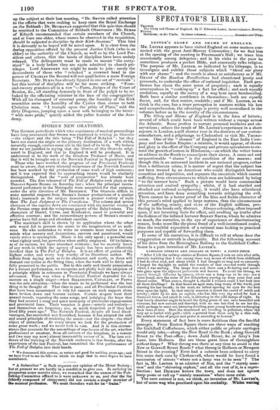SPOHR'S NEW ORATORIO.
THE German periodicals which take cognizance of musical proceedings have long announced that SPORR was employed in writing an Oratorio —the subject and the title being " The Fall of Babylon " : but they have not stated the origin or the primary destination of a work which, naturally enough, excites some stir in the land of its birth. We believe that we are justified in saying that the libretto of this Oratorio origi- nated in England, and that in England it will be produced. It is understood to be the work of the Gresham Professor of Music, and that it will be brought out at the Norwich Festival in September 1842.
Those who have watched the progress of our Provincial Festivals must be aware, that every triennial recurrence of the Norwich Festival has been marked by the production of some work of high eminence ; and it was expected that its approaching return would be similarly distinguished. And the "note of preparation" has already been sounded. The first rehearsal of The Fall of Babylon took place at the Hanover Square Rooms on Saturday last ; when the principal instru- mental performers in the Metropolis were assembled for that purpose, under the able direction of Mr. BEN-Enter. The Oratorio differs in some material respects from SPORE'S former productions of a similar kind; inasmuch as the subject demands a greater variety of style than The Last Judgment or The Crucifixion. The solemn and severe choruses of the captive Jews are contrasted with the martial strains of the Persian army and the voluptuous gayety of the Babylonians. The characters of Daniel, Cyrus, and Belshazzar, stand in powerful and effective contrast; and the extraordinary powers of SPOHR'S creative genius have full scope and abundant exercise. The musician's skill is shown by its application where the other arts would fail to present the scene to the imaginations of an audi- ence. He who undertakes to write an oratario must realize to their minds what scenery and decorations, canvass and pasteboard, would vainly strive to accomplish. Music is his only agent : a powerful one when rightly used, but powerless when unfitly employed. Of its failure, as of its success, we have abundant evidence ; but we scarcely know of any work in which the agency of music has been more effectively invoked than in The Fall of Babylon. It is an effort of genius of the highest order, and every way worthy of its illustrious author. We refrain from saying more as to its character and merit, as these will demand our notice at the fitting time, when the work will be fairly and fully presented to the public. But in this early and timely preparation for a distant performance, we recognize and gladly hail the adoption of a principle which in reference to Provincial Festivals we have always advocated. Time was when a Provincial Festival depended for its success on a singfe singer—when BILLINCTON, CATALANS, or PArra was the sole attraction—when the music to be performed was the last thing to be thought of. That time is past; and all Provincial Festivals that have been accustomed to rely for success on such support alone have broken down and become extinct. Certain singers went their animal rounds, repeating the same songs, and indulging the hope that they had secured a snug and quiet monopoly of provincial engagements and provincial fame. Their vocation is gone—utterly and entirely— and themselves are forgotten ; yes, as much forgotten as if they had lived fifty years ago.* The Norwich Festival, despite all local disad- vantages, has succeeded and flourished, because it has adopted the safe and sound principle of rendering the music—not the singers—the chief object of attraction. At every return we look fbr the production of some great work ; and we never look in vain. And it is this circum- stance that accounts for the assemblage of true lovers of the art, whether professional or amateur, from all corners of the kingdom, in a remote and (we may say now) almost inaccessible corner of it. The best evi- dence of the training of the Norwich orchestra is that SPORE, after his experience of the last Festival, has committed the first performance of The Fall of Babylon into their hands.
We denounced this system, as rotten and good for nothing, years ago ; and we have lived to see its fall—to which we hope that in some degree we have sentaibuted.
" A Subscriber " at Bath requests our opinion of the Motet Society ; bat at present we are hardly in a ccrnditiatr to give one. In noticing its prospectus some months since, we remarked that the names of the Pub- lishing-Committee affixed to it were unknown to us, and that the list (chiefly compose& of clergymen) did not eontain a single member of the musical profession. We must therefore wait for its "fruits."


























 Previous page
Previous page